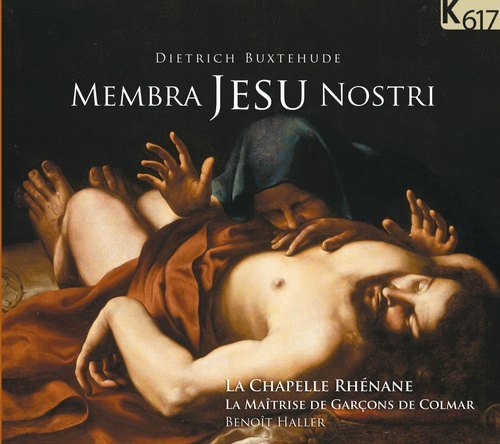
La Chapelle Rhénane, La Maîtrise de Garçons de Colmar, Benoît Haller - Buxtehude: Membra Jesu Nostri (2008)
BAND/ARTIST: La Chapelle Rhénane, La Maîtrise de Garçons de Colmar, Benoît Haller
- Title: Buxtehude: Membra Jesu Nostri
- Year Of Release: 2008
- Label: K617
- Genre: Classical, Sacred
- Quality: FLAC (image+.cue,log,scans)
- Total Time: 60:35
- Total Size: 298 Mb
- WebSite: Album Preview
Tracklist:
Dietrich Buxtehude (1637-1707)
Membra Jesu Nostri
[1] Ad pedes - Ecce super montes
[2] Ad genua - Ad ubera portabimini
[3] Ad manus - Quid sunt plagae istae
[4] Ad latus - Surge amica mea
[5] Ad pectus - Sicut modo geniti infantes
[6] Ad cor - Vulnerasti cor meum
[7] Ad faciem - Illustra faciem tuam
Performers:
La Chapelle Rhénane
La Maîtrise de Garçons de Colmar
Direction : Benoît Haller
Dietrich Buxtehude (1637-1707)
Membra Jesu Nostri
[1] Ad pedes - Ecce super montes
[2] Ad genua - Ad ubera portabimini
[3] Ad manus - Quid sunt plagae istae
[4] Ad latus - Surge amica mea
[5] Ad pectus - Sicut modo geniti infantes
[6] Ad cor - Vulnerasti cor meum
[7] Ad faciem - Illustra faciem tuam
Performers:
La Chapelle Rhénane
La Maîtrise de Garçons de Colmar
Direction : Benoît Haller
Membra Jesu Nostri (1680), a cycle of seven short cantatas contemplating different parts of the body of the crucified Christ, might be Buxtehude’s most enduring and popular work. This is the 14th recording to be released on CD, with half of those coming since 2000. Several of these are excellent. The finest versions by the Netherlands Bach Society (Channel), The Sixteen (Linn, 6/01) and Les Voix Baroques (ATMA, A/07) use only five singers and single instruments per part for Buxtehude’s seamless flow of sonatas, choruses and solo ensembles. Benoît Haller alternates six solo singers with a large choir in some choruses (much as John Eliot Gardiner and Masaaki Suzuki did). His changes of tempi between or during sections can seem wilful, as if deliberately to avoid repeating previous interpretations. Sometimes this produces some unconvincing moments, such as pulling back in speed and dynamic before launching into an over-egged final “Amen”. However, Haller’s choices of mood and rhetorical affect often produce lovely results (such as the gently lyrical patience conveyed in the first chorus of “Ad ubera portabimini”; its sluggish choral reprise is less convincing). This performance is unquestionably penitential in an affectionate way. Ritornelli and sonatas are often judged according to their emotional and poetic content, the viols in “Vulnerasti cor meum” (the exquisite contemplation of Christ’s heart) are sweetly expressive, and the solo singers convey admirable honesty. These characteristics serve to produce an experience that is warmly communicative, even if the intonation from the choir can be a little bit rough around the edges, and it is occasionally too quirky for an unreserved recommendation.
Classical | FLAC / APE | CD-Rip
As a ISRA.CLOUD's PREMIUM member you will have the following benefits:
- Unlimited high speed downloads
- Download directly without waiting time
- Unlimited parallel downloads
- Support for download accelerators
- No advertising
- Resume broken downloads


